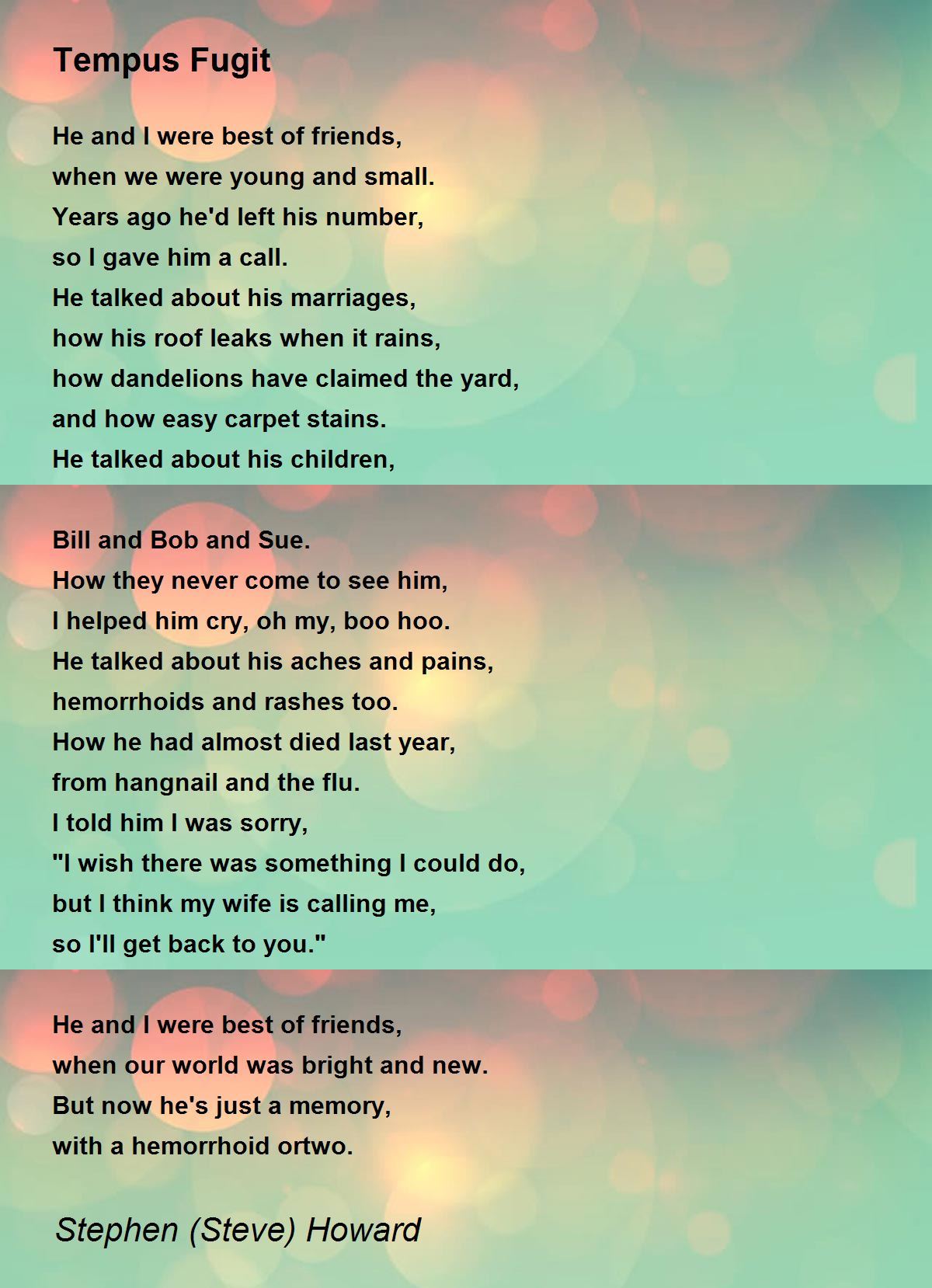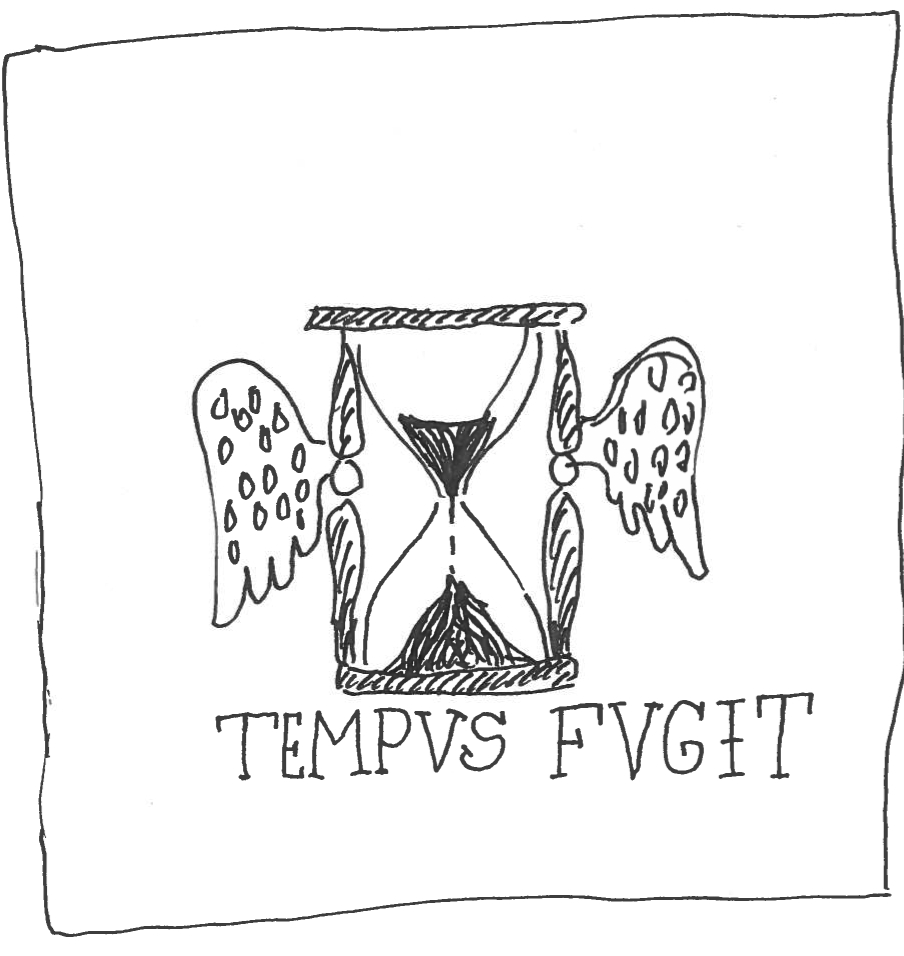
Tempus Fugit Amandine Nabarra
"Tempus fugit" expresses the idea that time is a precious and limited resource that should be valued and used wisely. Examples in Sentences Here are three example sentences showcasing the usage of "tempus fugit": As we grow older, we become increasingly aware of how tempus fugit and the importance of making the most of each day.
AOPolaR6xQYFFPTd1j53aAQZwf7TE_CGO2HYqLh3MK9OTg=s900ckc0x00ffffffnorj
Wikipedia Tempus fugit Tempus fugit en un reloj de sol. Tempus fugit es una expresión proveniente del latín con el significado «El tiempo se escapa» o «El tiempo vuela» invitando a no perderlo. La expresión aparece por primera vez en el libro III de las Geórgicas, poema escrito por el poeta latino Virgilio.

º¤•εℓ яiηcση ๔ε คiяℓυη°º¤• ♫ {Reseña Literaria} Tempus Fugit
Tempus fugit - questa celebre frase latina significa il tempo vola e sottolinea l'importanza di cogliere il momento presente e di non sprecare il proprio tempo. Carpe diem - tradotta come colgo il giorno, questa esortazione trae origine dalle opere del poeta Orazio e invita a vivere ogni giornata come se fosse l'ultima, cogliendo ogni.

Tempus fugit GambaJo
Tempus Fugit es una locución latina que hace referencia a la velocidad en que transcurre el tiempo. Esta expresión se traduce literalmente como 'el tiempo se escapa' o 'el tiempo vuela'. Es una invitación a valorar y aprovechar el tiempo en lugar de perderlo o dejar que pase sin hacer nada. Origen de la frase Tempus Fugit

Tempus Fugit Review completa del libro + Compra online Armando
La esencia de «tempus fugit» radica en su recordatorio de que el tiempo es fugaz. En un mundo donde a menudo nos sentimos atrapados en las rutinas diarias y preocupados por el futuro, esta expresión nos insta a reflexionar sobre la importancia de vivir en el presente. Nos recuerda que, al igual que un río que fluye implacablemente, el.

Tempus Fugit Tempus Fugit Poem by Steve Howard
Tempus Fugit · Propuesta de actividades 5 Investigar Castilla en el siglo xviii La novela transcurre en el año 102 d. I. (después de la Inundación) en un lugar llamado Nuevomundo. Podemos hacernos una idea bastante completa de cómo es la vida en ese futuro imaginado por el autor.

TEMPUS FUGIT
La más frecuente sin duda es " Tempus fugit = el tiempo huye ", con referencia explícita al veloz trascurso del tiempo. Es una frase tomada de un verso de Virgilio en su obra Georgicae, III, 284 que dice más exactamente "« Sed fugit interea fugit irreparabile tempus », « Pero huye entre tanto, huye irreparablemente el tiempo » .

Ad Aged Oscar's night in the Tempus Fugit.
TEMPUS FUGIT - Definición y sinónimos de tempus fugit en el diccionario inglés. [ˈtɛmpəs ˈfjuːdʒɪt] de «tempus fugit» en el diccionario inglés. de la definición en español. is a Latin phrase, usually translated into English as "". The expression comes from line 284 of book 3 of Vergil's is: The phrase is a common motto.

Tempus Fugit Fiction is Food
Tempus fugit definition: . See examples of TEMPUS FUGIT used in a sentence.

tempus fugit Gabriel Galád
About. LE closier is a fully refurbished 17th century former coacing inn which has been fully restored retaining the original beams and stone walls to create a wondefully relaxed bed and breakfast accommodation. The blend of old and new has been carefully matched to provide a spacious and light interior. We have 4 rooms three of which can sleep.

Tempus fugit Versos, Sabías que, Decir no
La expresión latina "tempus fugit" (el tiempo huye, el tiempo vuela) hace referencia explícita al transcurso veloz del tiempo, a la fugacidad de la vida. La locución tiene su origen en un verso del poeta Virgilio (70-19 a.C.), que escribe en las "Geórgicas: Sed fugit interea, fugit irreparabile tempus" (pero huye entretanto, huye.

Tempus Fugit
Tempus fugit è una frase latina, di solito tradotta in inglese come "tempo vola". L'espressione viene dalla riga 284 del libro 3 delle Georgiche di Vergil, dove appare come FVGIT INREPARABILE TEMPVS: "sfugge, tempo irreversibile". La frase viene utilizzata in entrambe le sue forme latine e inglesi come un proverbio che "il tempo è a perdere".

Batallas en Las Merindades TEMPUS FUGIT
In Conclusion: The Timeless Embrace of "Tempus Fugit". "Tempus Fugit" stands as a bridge between the past and the present, between ancient sages and modern thinkers. Let it serve as a beacon, illuminating the value of every fleeting second and urging us to hold onto the present with both hands. Embark on Further Idiomatic Journeys: Dive.
AGIKgqNahsDSjCDrKp14_iXfDdc73UdXVGetEG03zFiZ=s900ckc0x00ffffffnorj
Watch on El tiempo es un tema recurrente en la literatura y la música, y una de las expresiones más conocidas es "tempus fugit", que significa "el tiempo huye". Esta frase, proveniente del latín, es parte de un tópico literario llamado "tempus fugit", que hace referencia a la fugacidad de la vida y la importancia de aprovechar el presente.

Yes "Tempus Fugit" Guitar and Bass sheet music Jellynote
Esta frase latina se encuentra a menudo inscrita en la carátula de los grandes relojes de péndulo. En algunos relojes de sol puede encontrarse también esta frase completa: «Tempus fugit, sicut nubes, quasi naves, velut umbra». El tiempo vuela, como las nubes, como las naves, como las sombras.

Tempus Fugit Review completa del libro + Compra online Armando
Tempus fugit is a Latin phrase, usually translated into English as " time flies ". The expression comes from line 284 of book 3 of Virgil 's Georgics, [1] where it appears as fugit irreparabile tempus: "it escapes, irretrievable time". The phrase is used in both its Latin and English forms as a proverb that "time's a-wasting". Usage